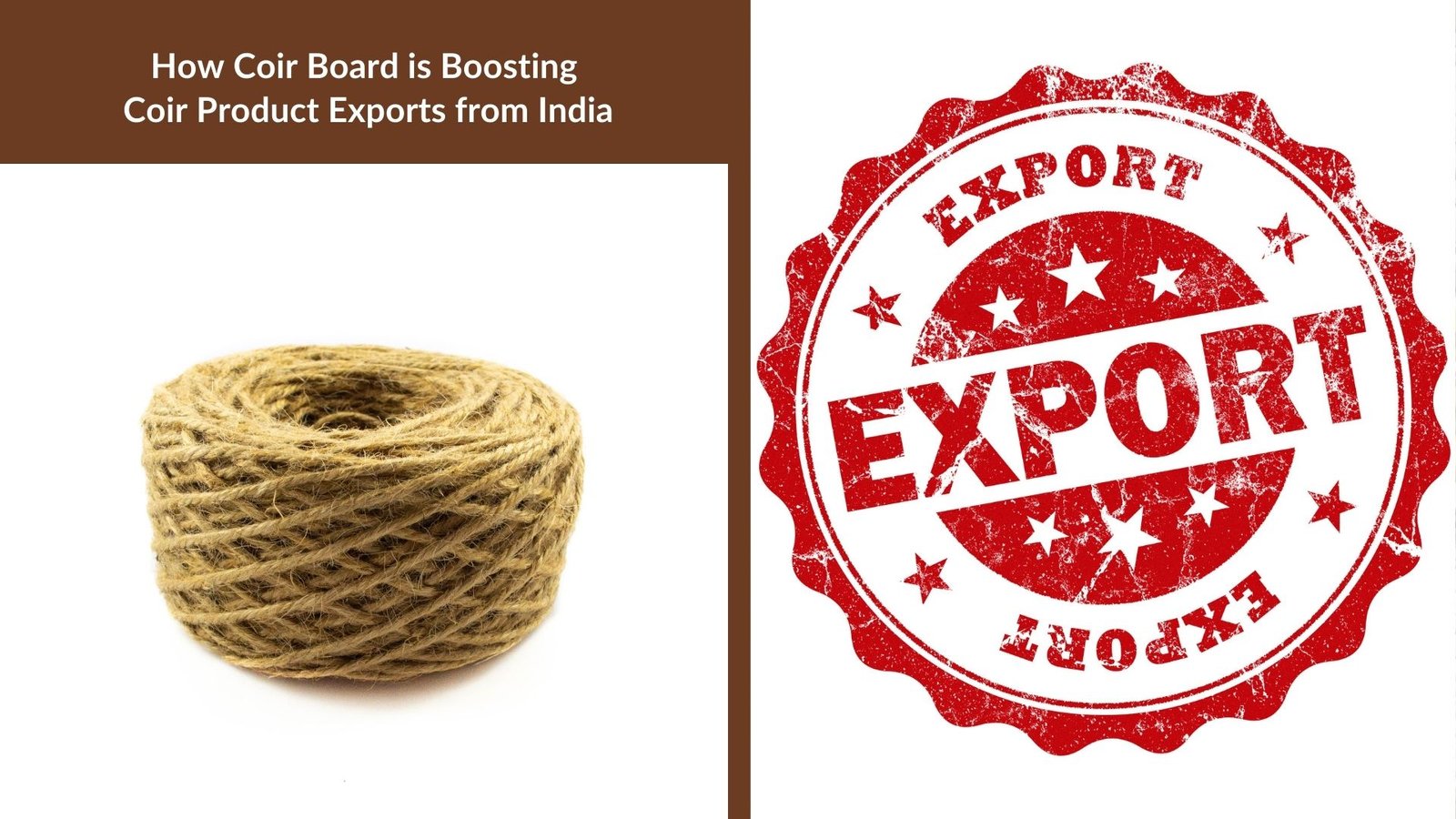How Coir Board is Boosting Coir Product Exports from India

The Coir Board of India has been instrumental in elevating the country’s coir industry, particularly in expanding its export footprint. Through a series of strategic initiatives, the Board has not only enhanced the quality and diversity of coir products but also strengthened India’s position in the global market.
Export Market Promotion Scheme
One of the flagship initiatives by the Coir Board is the Export Market Promotion (EMP) Scheme. This scheme aims to bolster the export performance of the Indian coir sector by:
-
Market Development Assistance: Providing financial support to exporters for participating in international trade fairs and exhibitions, thereby facilitating exposure to global markets.
-
Publicity and Promotion: Undertaking promotional activities such as advertisements, publicity campaigns, and buyer-seller meets to enhance the visibility of Indian coir products internationally.
-
Market Research: Conducting studies to identify potential markets and understand consumer preferences, enabling exporters to tailor their products accordingly.
These efforts have significantly contributed to the growth of coir exports. For instance, during the 2006-07 period, coir and coir products worth ₹605.17 crores were exported from India, reaching 97 countries. (coirboard.gov.in)
Technological Advancements and Product Diversification
The Coir Board has placed a strong emphasis on research and development to modernize the coir industry. Collaborations with institutions like IIT Madras have led to innovations such as Coir Geo Textiles (CGT), which are used in infrastructure projects to prevent soil erosion. Such advancements have opened new avenues for coir applications, increasing its demand globally.
Additionally, the Board is focusing on creating value-added products by blending coir with materials like jute and rubber. This diversification aims to cater to contemporary market trends and expand the product range, thereby enhancing export potential.
Infrastructure Development and Modernization
To improve productivity and quality, the Coir Board has implemented schemes such as the Coir Industry Technology Upgradation Scheme (CITUS). This initiative assists entrepreneurs in upgrading and procuring modern machinery, establishing state-of-the-art processing units, and adopting eco-friendly production techniques. The objectives include:
-
Creating employment opportunities, especially for women in rural areas.
-
Attracting new entrepreneurs to the industry.
-
Supporting the production of high-value, customer-oriented products.
By modernizing production processes, the Board aims to make the coir industry more competitive in the international market.
Skill Development and Employment Generation
Recognizing the importance of skilled labor, the Coir Board has launched programs like the Skill Upgradation and Mahila Coir Yojana. These schemes focus on:
-
Training Programs: Providing training to artisans, with a special emphasis on women, to enhance their skills in coir processing and product manufacturing.
-
Employment Opportunities: Encouraging self-employment by providing spinning equipment at subsidized rates to trained individuals.
Such initiatives have not only improved the quality of coir products but also contributed to the socio-economic development of rural areas.
Statistical Growth in Coir Exports
The concerted efforts of the Coir Board have yielded impressive results. In the 2019-20 period, coir exports reached a record high of ₹2,757.90 crores, with a total of 988,996 tonnes of coir and coir products exported. Value-added items like tufted mats contributed to 33% of the total export volume.
The major export destinations include the USA, China, South Korea, the UK, Spain, Australia, the Netherlands, Italy, Germany, Canada, Belgium, France, and Israel. The USA stands as the largest importer, accounting for 16.9% of the total quantity and 29.79% of the total value exported from India in 2021-22.
Future Prospects
Looking ahead, the government plans to amend the 72-year-old Coir Industry Act to boost exports by introducing value-added products like jute and rubber blended coir. Reducing the size of the Coir Board by 50% aims to facilitate faster decision-making. The move also envisions establishing export facilitation centers for producers, aiming to drive up coir and coir product exports by about 50% to ₹5,000 crores by 2027.
How Altus Exports Can Assist Indian Manufacturers
As Indian coir manufacturers look to expand their global footprint, partnering with experienced export facilitators becomes crucial. Altus Exports offers comprehensive solutions to assist manufacturers in reaching international markets.
Quality Assurance
Altus Exports prioritizes quality at every step, from sourcing to packaging. Their rigorous quality control processes ensure that products meet the highest standards, which is essential for gaining trust in international markets.
Extensive Network
With a robust network of trusted suppliers, manufacturers, and artisans across India, Altus Exports offers a diverse range of products and swift response times to meet global demands. This extensive network facilitates efficient market entry and expansion.(altusexports.com)
Customer-Centric Approach
Altus Exports works closely with manufacturers to understand their requirements and provide tailored solutions. Their dedicated support team is always available to assist, ensuring a seamless partnership experience.
Coir Board’s Sustainability Initiatives: Making Indian Coir a Global Eco-Brand
How Coir Board is Helping Small-Scale Coir Manufacturers Enter the Global Market
India’s Rising Coir Export Trends: The Role of Coir Board in Expansion
Technology & Innovation: How Coir Board is Modernizing the Coir Industry for Global Demand
Coir Board’s Quality Certification and Its Impact on Coir Exports
Coir Board’s Trade Fairs and Exhibitions: Unlocking Global Markets for Indian Coir
Export Incentives & Subsidies: How Coir Board is Empowering Exporters
Coir Board’s Role in Promoting Eco-Friendly Coir Products in Global Markets
Government Schemes for Coir Exporters: How Coir Board Supports Entrepreneurs
How Coir Board is Boosting Coir Product Exports from India
